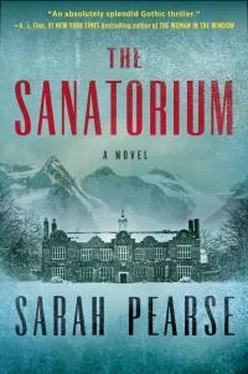“They’ve just announced the funicular’s down.” Mat jams his key into his locker. “Won’t be running until morning.”
Adele looks through the window. The storm is raging now, wind howling as it batters the side of the hotel.
“What about the buses?”
“Still running, but they’ll be busy.”
He’s right . Biting down on her lip, Adele checks her watch.
She’s meant to be in the valley in an hour. If she hurries, she might make it.
Adele says good-bye, and lets herself out the side door. She pauses, shivering, stunned by the force of the wind. It’s strong, blowing icy pellets of snow into her face and eyes. Her cheeks are burning from the cold.
Pulling her scarf up around her nose, Adele walks out onto the small track leading to the front of the hotel.
With every step, her feet sink into the snow. It immediately starts seeping through the thin leather of her boots. Idiot. She should have worn her proper snow boots. Her feet will be soaked in minutes.
Carefully avoiding the bigger mounds of drifting snow, she keeps walking. A few feet on, she feels her phone vibrate in her pocket. She stops, pulls it out. It’s a message from Stephane: Leaving work now. See you soon.
Work.
The word stirs up a familiar, bitter resentment. Adele hates herself for it.
She knows it’s no good dwelling on what might have been—the climb up the career ladder, the accompanying salary, the travel, but she can’t help it.
However she tries to position it in her mind, make justifications, it’s blatantly clear that it’s she who has made the sacrifices, not Stephane. He didn’t have to give up his plans when Gabriel was born, his place at college. He graduated with top honors and got a job right away at a multinational in Vevey working in brand management. Stephane was highly rated, doing well. Earning even better.
His girlfriend works for the same company, pulling in an equally impressive salary, Adele can tell. Lise isn’t flashy, but the subtly expensive grooming and innate confidence speak for themselves.
This, she can just about cope with—it’s a petty, silly envy, nothing more, but it’s the potential effect on Gabriel that bothers her. Adele knows it won’t be long before Gabriel starts noticing the differences between his parents’ jobs.
Part of her is scared that he’ll look down on her—that he’ll see her, and what she can give him, as inferior to what Stephane can provide.
Adele knows it’s stupid to think ahead like this, because at the moment everything Gabriel loves has nothing to do with money: snuggles and books before bed. Hot chocolate with whipped cream. Joint play in the sandbox. Sledding.
She smiles to herself as she remembers the trip last week. Squeezed onto the sled together, the two of them had built up so much momentum that they’d careered out of control into the fence at the bottom of the hill. Gabriel ended up spread-eagled on top of her, laughing hysterically.
The memory instantly puts her anxieties into perspective. Pull it together , she tells herself, stepping sideways to avoid a fallen branch. Stop thinking the worst.
It’s then that she feels something on her ankle, a pressure.
Has she caught it on something? Another branch?
Glancing down, she freezes. A gloved hand is around her ankle.
There’s a sudden tug, jerking her backward.
Adele lands face-first in soft, powdery snow.
Tiny, icy particles fill her mouth and eyes.
6
The white pendants dangling from the ceiling remind Elin of a hangman’s noose.
The wires are so long they traverse for several yards, cable hanging slack in the middle before descending farther on. The pendant itself is nothing more than a violent spasm of wire forming an intricate loop.
Undoubtedly hideously expensive, an artistic statement she doesn’t “get,” but however you see it, it’s strange, Elin thinks, to have that in a hotel reception.
Something so sinister, in what’s meant to be a welcoming space.
The rest of it isn’t much better—leather chairs arranged around a narrow wooden table, a large slab of gray stone for the reception desk. Even the painting over the fireplace is bleak; swirls of gray and black paint angrily smeared across the canvas.
“What do you think?” Elin nudges Will. “An architect’s dream?” She can already predict the words he’ll quote later: boundary pushing, soulful, immersive.
Elin’s absorbed these words by osmosis because to her they hold a kind of poetry. How Will talks about architecture, how he finds all that wonder in bricks and mortar, reveals so much about how he thinks and feels.
“Love it,” he replies. “Buildings like this had a massive effect on twentieth-century architecture. Features people associate with modernism were used for the first time in sanatoriums.” Will stops, taking in her expression. “You don’t like it, do you?”
“I don’t know. To me, it feels cold. Clinical. Such a big space, and there’s hardly anything in here. A few chairs, tables.”
“It’s deliberate.” Elin hears the slight tension in his words—he’s frustrated that she doesn’t get it right away. “The white walls, wood, the natural materials. It’s a nod to the sanatorium’s original design.”
“So they want it to seem sterile?” It seems strange to her: that anyone would deliberately design something to be devoid of any warmth, comfort.
“It was a hygiene thing, but they also thought that whitewashing helped bring an ‘inner cleanliness.’” He makes quote marks with his fingers. “Architects then were experimenting with using design to influence how people felt. A building like this was used as a medical instrument in itself, every detail custom designed to help patients recover.”
“What about all this glass? I’m not sure it would help me.” Elin looks through the vast window at the snow being whipped into a fury, the drifts creeping past the frame. Hardly any barrier between her and the outside world. Despite the warmth coming from the fire, she shivers.
Will follows her gaze. “They thought natural light, the big views of the landscape, were healing.”
“Maybe.” As she looks past him, her eyes alight on a glass box hanging from the ceiling by a thin metal wire.
Walking over, she finds a small silver flask inside. A few words of text are written below, in both French and English.
CRACHOIR—SPITTOON. Commonly used by patients to reduce the spread of infection.
She beckons to Will. “You’re telling me that’s not weird? Hanging here, like some strange art installation.”
“This whole place is an installation.” Touching her arm, he softens his tone. “It’s not that, is it? You’re nervous, aren’t you? About seeing him again.”
Elin nods, leaning into him, breathing in the familiar, comforting smell of his aftershave—peppery basil and thyme, a slight smokiness. “It’s been nearly four years, Will. Things change, don’t they? I’ve got no idea who he is, not anymore.”
“I know.” He holds her tight. “But don’t overthink it. Put the past in the past. You coming here, it’s a fresh start. Not just with Isaac, but with the Hayler case too. It’s time to draw a line.”
It’s so easy for Will, Elin thinks. As an architect, every day is a blank page. He’s always starting over, creating something new.
It was this quality that struck her the first time they met. How fresh he seemed. Unjaded. Elin wondered if she’d ever met anyone truly like that before—optimistic, excited by life. Excited by every little thing.
The day they’d met, she’d been running. She’d finished her shift, a shift she’d spent mainly at her desk churning through paperwork, and had decided to run the coast path, from her apartment in Torhun toward Brixham. An easy 10K there and back.
Читать дальше












